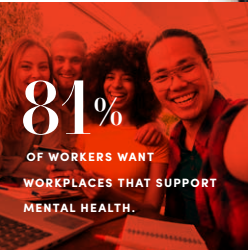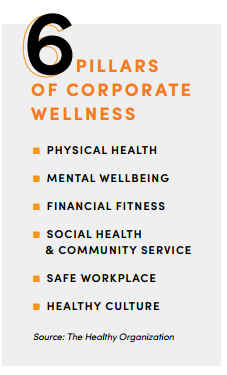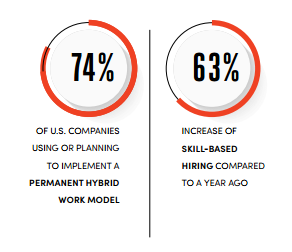Top 4 Trends Changing the Corporate Environment
The workplace experience has rapidly evolved over the last few years. Employee expectations, disruptive technology and organizations’ willingness to be more flexible have shaken up the traditional approach to building a corporate environment. Here are four hot trends relevant to direct selling companies.
1/ Wellness and Mental Health

In the “personal development program with a comp plan” industry, corporate employees can get overlooked, with so much energy and resources pouring into developing the distributor field. But focusing on the wellbeing and mental health of employees is a bigger priority than ever. Human resources departments have evolved far beyond just people management. A Surgeon General report on Mental Health and Wellbeing shows that 81 percent of workers want workplaces that support mental health. According to SelectHub, “there’s a 22 percent gap between employer and employee perceptions of wellbeing at work, as well as a strong correlation between toxic work cultures and burnout.”
Revitalizing employee wellbeing can come in many forms. Some companies offer in-house counseling or reimburse the cost for a certain number of outside counseling sessions per year. Offering healthy snack options in break areas, a dedicated gym or workout room, and individual quiet rooms also are becoming norms in the corporate space. Some companies are even offering in-office massages or hosting fitness challenges with prizes awarded for different accomplishment levels.
2/ Skills Over Degrees
More companies are focusing their hiring criteria based on skills rather than degrees. Data from research firm Remote shows that skill-based hiring is up 63 percent compared to a year ago. “Making hiring decisions based on experience, attitude and value-match rather than focusing on specific academic achievements advances equality and opens up the playing field for talented individuals from a range of different backgrounds,” states a blog post on the firm’s website.
A study by the Burning Glass Institute shows that online job listings requiring a college degree dropped from 51 percent in 2017 to 44 percent in 2021. Focusing on relevant skills broadens the talent pool and allows for more diverse backgrounds and perspectives. Prospective employees also can illustrate their skills with online portfolios or performing sample tasks before hiring. Many can stay up to date with evolving skills and technologies just as well or even more so than degreed candidates. A skills-based strategy is also more meritocratic than focusing on degrees, which in many cases could be outdated based on when they were acquired.

3/ The Future is Flexible
According to a Zippia report, 74 percent of U.S. companies are using or planning to implement a permanent hybrid work model. But flexibility doesn’t just mean working remotely or with a hybrid schedule. It also includes restructuring the traditional work week. Some companies opt for four days a week, even if it means longer days. Some employees are willing to work some weekends if it means they get to choose which weekdays they are off.
“Work flexibility is clearly something desired by all segments of workers,” says a Forbes article. “This is not just a benefit in a tight labor market. We need to ask ourselves what new work rhythms can we create that will allow flexibility for all workers?”
Technology is a huge driving force for a more flexible work experience. Digital communication options from emails to chat groups to video streaming, task-based project platforms such as Asana, file-sharing platforms, and even virtual avatars are becoming a normal experience no matter what percentage of a workforce is in-office or remote.
Flexibility can also influence the design of the physical workplace. This could include a more open office setting, stand-up desks, various options for workstations, mobile devices and digital signage for collaboration. Some companies are even utilizing coworking office spaces for employees who don’t live near headquarters. The traditional cubical rows and closed-door offices for management are fading fast.

4/ Lighting a Career Pathway
Direct selling companies do a terrific job of laying out goals, specific action steps and detailed compensation for the field. But are you laying out a similar path for your corporate employees? Business News Daily says that just 25 percent of employees feel confident about the career opportunities at their companies. A Gartner report showed that 44 percent of HR professionals think their companies don’t offer compelling career paths.
Highlighting internal career options can be just as important as compensation when it comes to employee retention. This doesn’t always mean climbing the corporate ladder, but also providing opportunities to evolve skills and encouraging employees to provide value in ways outside of their core job duties. It can also include pathways to professional and personal development through training programs, books, online courses or workshops. These opportunities might be less visible for hybrid or remote workers. Some companies have created “employee experience” managers to help facilitate this. They also help employees find innovative ways to connect to the company and coworkers.
From the July/August 2023 issue of Direct Selling News magazine.


